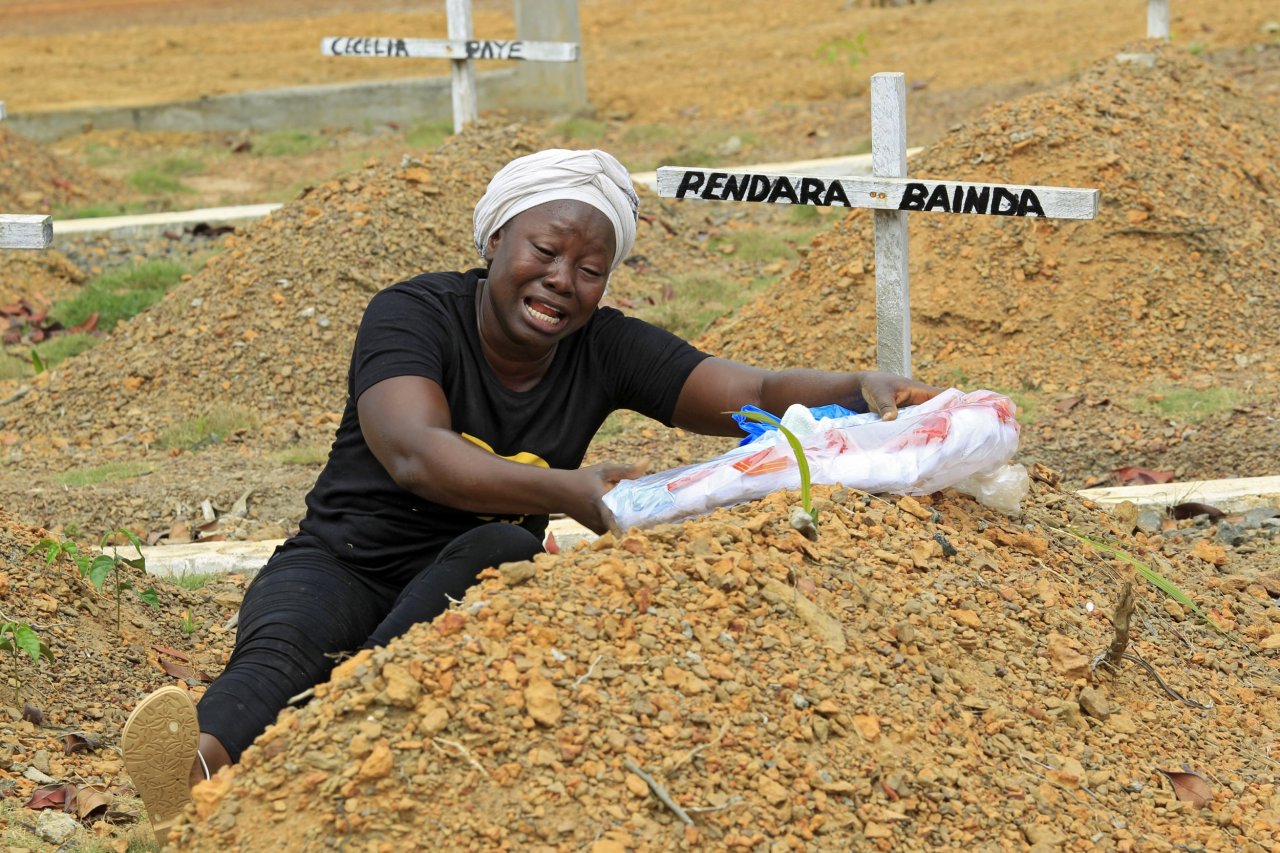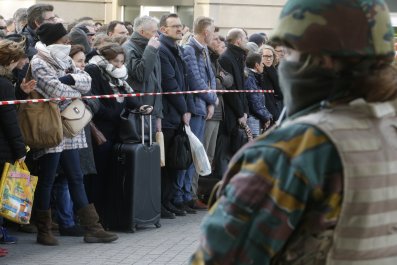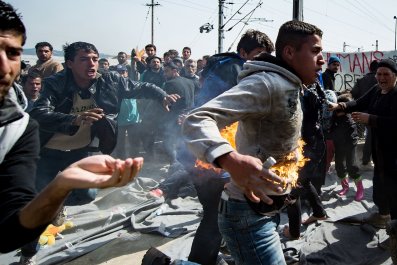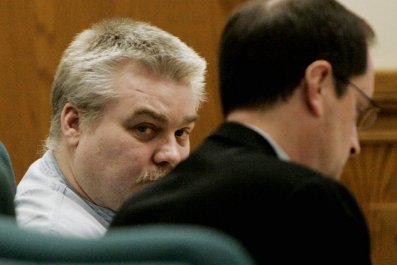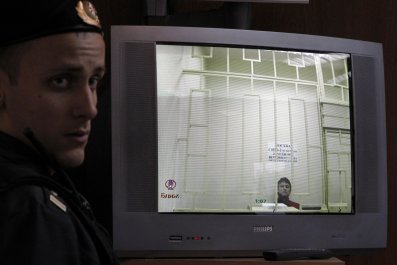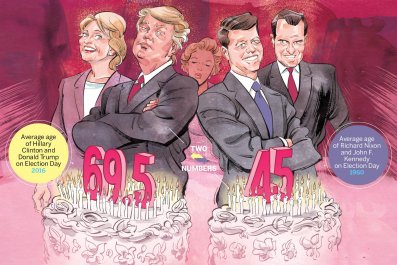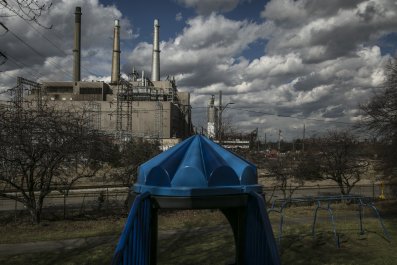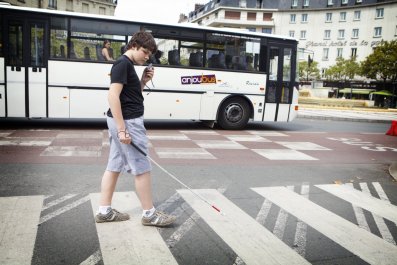Gertrude Sieh, a handsome 60-year-old woman with gray braids, was among the first in her community to enroll in a trial in January last year to test two Ebola vaccines. "There were rumors that we will get sick and become like a monster," Sieh told me a year later as she sat outside her zinc house in Popo Beach, which lost 40 people in July 2014, when Ebola was burning through Liberia's capital of Monrovia and its surrounding suburbs. Back then, monsters seemed real: Bodies littered the streets while denial and conspiratorial hearsay ran far and wide, and the international community had yet to wake up to the scale of the crisis.
Since Sieh signed up for the study, the World Health Organization has declared Liberia "Ebola-free" three times. On January 14 this year, it declared all of West Africa Ebola-free. "Detecting and breaking every chain of transmission has been a monumental achievement," said Dr. Margaret Chan, the director-general of the WHO. Less than 24 hours later, the Sierra Leonean government announced that the body of recently deceased 22-year-old Mariatu Jalloh had tested positive for Ebola. Later, a WHO report would find that health care workers did not wear protective equipment when treating Jalloh and had sent her body back to her family without testing it for the virus. In turn, her family bathed Jalloh's body for burial in traditional Islamic fashion, sparking fears of another outbreak. Luckily, only Jalloh's aunt was infected; she was discharged in early February. Then the next 42-day countdown began—two times what researchers believe is the maximum incubation period for the virus.
On March 17, the WHO announced "the end of the recent flare-up of Ebola virus" in Sierra Leone but urged the nation, along with Guinea and Liberia, to "remain on high alert." (And indeed, that same day, two new Ebola cases were confirmed in Guinea; by March 25, five had died in the "flare-up," and Liberia had closed its border with Guinea. ) While Sierra Leone was not declared Ebola-free this time around, the WHO has not explained its past decisions to state that these countries are rid of the virus when some experts think the disease has been in circulation for decades and could become endemic. Without a proven vaccine or cure, and little knowledge about how long the virus stays in the body, some argue these attestations are pointless. Countries are rarely declared free of endemic diseases unless they have been eradicated over years through comprehensive vaccination. Nigeria, where mass inoculations against polio have occurred over the past 30 years, has not had a case in over 12 months, yet the WHO does not classify Nigeria as "polio-free." Instead, it has simply taken it off the polio-endemic list.
Mosoka Fallah, a Harvard-trained Liberian epidemiologist, says Ebola-free declarations aren't accurate or helpful while researchers are still learning so many new things about the virus. "I knew it was just a matter of when rather than if ," Fallah says of the new cases. Fallah is the chief investigator on a five-year study of the ongoing effects of the virus on survivors. He and his colleagues have traced the virus and human transmission across Monrovia and other parts of Liberia, and led investigations into two flare-ups that emerged since Liberia was first labeled Ebola-free. Both of those were traced back to Ebola survivors.
The Ebola outbreak in West Africa, the largest in history, changed scientific knowledge of the nature of the disease, particularly with regard to the presence of the virus in the body after a patient has recovered. Since Ebola was discovered in the 1970s in the north Democratic Republic of Congo (then called Zaire), geographical regions have been declared Ebola-free after going through two cycles of 21 days without registering a case. The classification has been used in outbreaks in Uganda, the DRC, South Sudan and parts of central Africa.
But until recently, a lot of the knowledge about Ebola's ongoing presence and effects on the body was anecdotal, says Peter Piot, the Belgian microbiologist who discovered the virus in 1976 when called to investigate a mysterious outbreak in the small, remote village of Yambuku. The size and scale of the 2014 outbreak—along with advancements in technology—enabled scientists to conduct research into the virus and survivors that had previously been impossible, Piot says. It also helps that, for the first time, the West is deeply involved; the movement of infected individuals across international borders led the WHO to declare the outbreak an "international public health emergency" and the WHO and U.S. government health bodies, such as the National Institutes of Health (NIH), to invest more than they ever have into Ebola research.
Now we're learning that reports of survivors infecting others through semen or breast milk were largely hearsay, but there's a growing body of evidence suggesting the virus remains present in semen for as long as 18 months. This past December, researchers found evidence of the first proven case of sexual transmission of the Ebola virus when examining the case of a woman who had died from Ebola in late March 2015, after having sexual intercourse with a man who had been discharged six months earlier from an Ebola treatment . The man's blood was clear of the virus—but his semen wasn't, according to Fallah. This calls into question the traditional definition of a country being Ebola-free after two incubation cycles without a case. If human survivors are not completely clear of the virus—and there are currently an estimated 15,000 of them from the last outbreak in West Africa—how can a nation or a region be?
While the WHO's time period for declaring a nation Ebola-free has yet to change, the organization's policies and advisories have evolved to reflect the new knowledge of the virus. At the beginning of the outbreak, the WHO instructed male survivors to ensure they practice safe sex for three months, but when research suggested that Ebola could remain in semen for up to nine months, it changed the advisory to one year, adding that survivors should have two negative tests before they consider having unprotected sex. In February, WHO released a manual for health workers on how to clinically treat survivors, detailing the need to continue strict infection prevention and control protocols for handling and testing vaginal fluids, semen and breast milk that could contain traces of the virus and possibly infect medical staff. Health workers will be trained in the new protocols in the coming months.
But it does seem that without the immediacy of an outbreak—and perhaps with the suggestion that West Africa is now Ebola-free—some of the urgency has abated. The NIH and the Liberian government had worked together to plan trials to study the efficacy of experimental vaccines, and were expected to enroll 27,000 participants. But by the time those were scheduled to begin, the Ebola outbreak was burning out, and the study was downgraded; instead of looking for proof the vaccine protected patients against the virus, the study would now examine immune response to the vaccines and try to determine whether the drugs were safe for human consumption.
In the absence of a cure or vaccine, studies into the origins, development and long-term effects of the virus will continue. Dr. Anthony Fauci, the director of the NIH's National Institute of Allergy and Infectious Diseases, says the outbreak as we knew it is over, but research must continue. "Ebola is here in the world. It hasn't gone away; there are animal reservoirs. There will be cases of Ebola likely here and in other countries, like Uganda and South Sudan," he says. Research will soon begin into which animals are vectors of the virus and what triggers animal-to-human transmission.
Bangalee Yogee is a 23-year-old Ebola survivor in Fallah's study of the long-term impact of the virus on those whose bodies it has infiltrated. In January, he wandered around his community of West Point, a hot spot of Ebola infection during the outbreak in Monrovia. He was searching for other survivors and their close contacts—intimate partners and the people who cared for them when they were sick—to enroll in the study.
Yogee told residents the researchers were looking for people who had gone to the Ebola treatment unit, so they could study the medical conditions they face as a result of their infection. Ebola survivors experience problems with their ears, eyes and bones, he said. Men experience impotence, and women have miscarriages or no longer get their periods, he added. Yogee himself suffers from back and head pain.
Piot insists the definition of a country as Ebola-free remains necessary. It can help a country and its people return to a sense of normal, he says. At the same time, he admits the presence of thousands of male survivors, coupled with reservoirs of bats that could carry the virus, makes it difficult to anticipate a final end to the epidemic. "It will happen again, that is unavoidable—but hopefully not on the same scale," says Piot. "The key lesson is to act early."
Back in Popo Beach, Sieh said she has heard the announcements of the end of Ebola again and again. And for her, the worst of the epidemic has passed, and the flare-ups in other communities are not cause for alarm. But the memory of the sudden deaths of her neighbors remains, she said. "We pray that it doesn't happen again."



